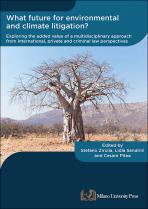What future for environmental and climate litigation? Exploring the added value of a multidisciplinary approach from international, private and criminal law perspectives
Synopsis
The book provides in-depth analysis and innovative insights on the prospects of climate and environmental litigation, namely by exploring the ability of judicial remedies and sanctions to affect public and private decision-making in every context where natural resources, climate as well as human health are at stake. The chapters reproduce, with additional elaborations, the papers presented at the international workshop that gives the volume its title, held at the University of Milan on 16 September 2022. The underlying question is whether and to what extent, in the face of unsatisfactory and unreasonable political choices on the balance between the different interests at stake, resorting to national and supernational courts represents a valid alternative for a more sustainable future. The relevant contexts covered by the book include, for instance, industrial development, exploitation of natural resources, agricultural production, manufacturing techniques, as well as policies on energy, public and private transport, and urban development. The book is composed of three parts, each one addressing, from multiple perspectives, a specific category of judicial remedies in a certain area of legal studies: I) international human rights law; II) private international law and international trade law; II) domestic and international criminal law.
Chapters
-
Minimum ecological standards for the evolution of the Strasbourg system towards Ecological human rights
-
Climate litigation between international law and domestic remedies: the virtuous example of collective claims
-
What future for litigation on climate change adaptation?The potential of a human rights approach
-
Towards climate democracies? Legal systems’ adaptation to climate change litigation
-
Transnational corporate liability in the era of loss and damages: the case of Asmania et al. v. Holcim
-
Some reflections on the consistency of the EU CBAM with the GATT
-
The protection of the environment under the ICC Rome Statute: does the wheel really need to be reinvented?
-
Must environmental criminal law always be dependent on administrative law? Assessing the opportunity for a limited number of offences being autonomous from administrative law
-
Parental liability doctrine and environmental crimes: limits and perspectives
-
Making nature’s voice heard in criminal proceedings
Downloads


This work is licensed under a Creative Commons Attribution-ShareAlike 4.0 International License.
